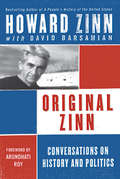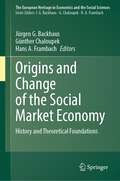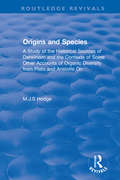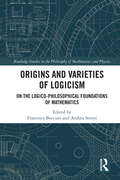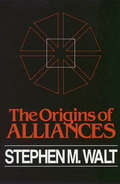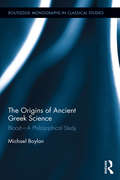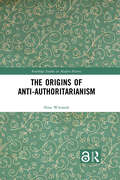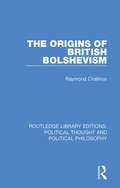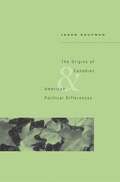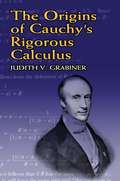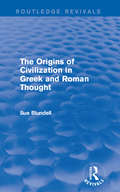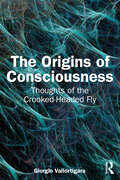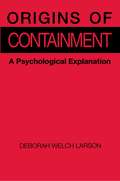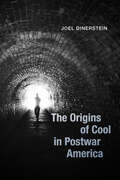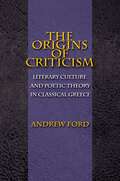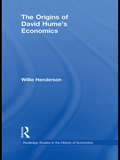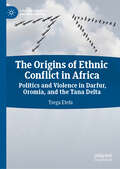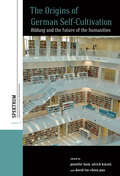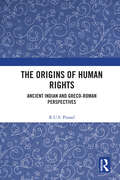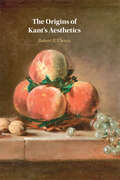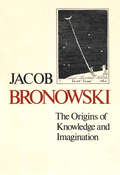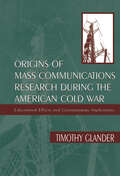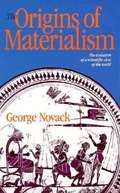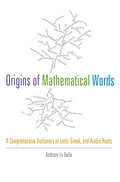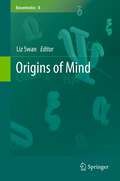- Table View
- List View
Original Zinn: Conversations on History and Politics
by Howard ZinnHistorian, activist, and bestselling author Howard Zinn has been interviewed by David Barsamian for public radio numerous times over the past decade. Original Zinn is a collection of their conversations, showcasing the acclaimed author of A People's History of the United States at his most engaging and provocative.Touching on such diverse topics as the American war machine, civil disobedience, the importance of memory and remembering history, and the role of artists--from Langston Hughes to Dalton Trumbo to Bob Dylan--in relation to social change, Original Zinn is Zinn at his irrepressible best, the acute perception of a scholar whose impressive knowledge and probing intellect make history immediate and relevant for us all.
Origins and Change of the Social Market Economy: History and Theoretical Foundations (The European Heritage in Economics and the Social Sciences #26)
by Jürgen G. Backhaus Günther Chaloupek Hans A. FrambachThis edited volume addresses the theoretical and historical foundations of the German Social Market Economy. Written to commemorate the 75th anniversary of the establishment of the Social Market Economy, chapter contributions discuss the ideas of its theoretical founders—Walter Eucken, Alfred Müller-Armack, Wilhelm Röpke, and Franz Böhm--as well as related influences such as Ordoliberalism, the historical school of economics, and the Catholic social doctrine. In addition, chapters analyze differences and parallels to alternative policy concepts, in particular Keynesianism. Finally, the volume turns toward contemporary discussions of the Social Market Economy in the present political and economic context, specifically its ability to cope with current challenges. Providing rich context for the establishment of Germany’s contemporary economic system, this volume will be of interest to researchers and students of political, social and economic systems, the history of economic thought, and political history.
Origins and Species: A Study of the Historical Sources of Darwinism and the Contexts of Some Other Accounts of Organic Diversity from Plato and Aristotle On (Routledge Revivals #897)
by MJS HodgeOriginally published in 1991, Origins and Species seeks to understand the historical origins of Darwinism. The book analyses the explanatory problem of species variation to which Darwinian theory was a response, while contrasting the Darwinian with other traditions of the time, in the interpretation of organic diversity. The book looks in detail at both Charles Darwin’s theories and Alfred Russell Wallace’s theories of about plant and animal species and raises the question of the context of Darwinism and that of Plato’s and Aristotle’s understanding of species.
Origins and Varieties of Logicism: On the Logico-Philosophical Foundations of Mathematics (Routledge Studies in the Philosophy of Mathematics and Physics)
by Francesca Boccuni Andrea SereniThis book offers a plurality of perspectives on the historical origins of logicism and on contemporary developments of logicist insights in philosophy of mathematics. It uniquely provides up-to-date research and novel interpretations on a variety of intertwined themes and historical figures related to different versions of logicism.The essays, written by prominent scholars, are divided into three thematic sections. Part I focuses on major authors like Frege, Dedekind, and Russell, providing a historical and theoretical exploration of such figures in the philosophical and mathematical milieu in which logicist views were first expounded. Part II sheds new light on the interconnections between these founding figures and a number of influential other traditions, represented by authors like Hilbert, Husserl, and Peano, as well as on the reconsideration of logicism by Carnap and the logical empiricists. Finally, Part III assesses the legacy of such authors and of logicist themes for contemporary philosophy of mathematics, offering new perspectives on highly debated topics—neo-logicism and its extension to accounts of ordinal numbers and set-theory, the comparison between neo-Fregean and neo-Dedekindian varieties of logicism, and the relation between logicist foundational issues and empirical research on numerical cognition—which define the prospects of logicism in the years to come.This book offers a comprehensive account of the development of logicism and its contemporary relevance for the logico-philosophical foundations of mathematics. It will be of interest to graduate students and researchers working in philosophy of mathematics, philosophy of logic, and the history of analytic philosophy.
The Origins of Alliance (Cornell Studies in Security Affairs)
by Stephen M. WaltHow are alliances made? In this book, Stephen M. Walt makes a significant contribution to this topic, surveying theories of the origins of international alliances and identifying the most important causes of security cooperation between states. In addition, he proposes a fundamental change in the present conceptions of alliance systems. Contrary to traditional balance-of-power theories, Walt shows that states form alliances not simply to balance power but in order to balance threats. Walt begins by outlining five general hypotheses about the causes of alliances.Drawing upon diplomatic history and a detailed study of alliance formation in the Middle East between 1955 and 1979, he demonstrates that states are more likely to join together against threats than they are to ally themselves with threatening powers. Walt also examines the impact of ideology on alliance preferences and the role of foreign aid and transnational penetration. His analysis show, however, that these motives for alignment are relatively less important. In his conclusion, he examines the implications of "balance of threat" for U.S. foreign policy.
The Origins of Ancient Greek Science: Blood—A Philosophical Study (Routledge Monographs in Classical Studies #22)
by Michael BoylanThis book examines the origins of ancient Greek science using the vehicles of blood, blood vessels, and the heart. Careful attention to biomedical writers in the ancient world, as well as to the philosophical and literary work of writers prior to the Hippocratic authors, produce an interesting story of how science progressed and the critical context in which important methodological questions were addressed. The end result is an account that arises from debates that are engaged in and "solved" by different writers. These stopping points form the foundation for Harvey and for modern philosophy of biology. Author Michael Boylan sets out the history of science as well as a critical evaluation based upon principles in the contemporary canon of the philosophy of science—particularly those dealing with the philosophy of biology.
The Origins of Anti-Authoritarianism (Routledge Studies in Modern History)
by Nina WitoszekThis book discusses the ongoing revolution of dignity in human history as the work of ‘humanist outliers’: small groups and individuals dedicated to compassionate social emancipation. It argues that anti-authoritarian revolutions like 1989’s ‘Autumn of the Nations’ succeeded in large part due to cultural and political innovations springing from such small groups. The author explores the often ingenious ways in which these maladapted and liminal ‘outliers’ forged a cooperative and dialogic mindset among previously resentful and divided communities. Their strategies warrant closer scrutiny in the context of the ongoing 21st century revolution of dignity and efforts to (re)unite an ever more troubled and divided world.
The Origins of British Bolshevism (Routledge Library Editions: Political Thought and Political Philosophy #13)
by Raymond ChallinorFirst published in 1977. This book describes the growth of revolutionary organisations in Britain from 1900 onwards. It shows that there was an indigenous movement that developed quite independently from the left in other countries, although its basic outlook was remarkably similar to that of the Bolsheviks in Russia. The study concentrates the activities of the Socialist Labour Party, a small group of dedicated revolutionaries, whose impact on working-class politics had not been fully recognised. The most controversial section of the book deals with the Russian influence on the machinations that led to the formation of the British Communist Party. It is critical of Lenin, who sometimes gave advice on the basis of insufficient knowledge, and of Comitern agents, like Theodore Rothstein, with dubious political backgrounds. This title will be of great interest to students of politics, philosophy, and history.
The Origins of Canadian and American Political Differences
by Jason KaufmanWhy do the United States and Canada have such divergent political cultures when they share one of the closest economic and cultural relationships in the world? Canadians and Americans consistently disagree over issues such as the separation of church and state, the responsibility of government for the welfare of everyone, the relationship between federal and subnational government, and the right to marry a same-sex partner or to own an assault rifle.In this wide-ranging work, Jason Kaufman examines the North American political landscape to draw out the essential historical factors that underlie the countries’ differences. He discusses the earliest European colonies in North America and the Canadian reluctance to join the American Revolution. He compares land grants and colonial governance; territorial expansion and relations with native peoples; immigration and voting rights. But the key lies in the evolution and enforcement of jurisdictional law, which illuminates the way social relations and state power developed in the two countries.Written in an accessible and engaging style, this book will appeal to readers of sociology, politics, law, and history as well as to anyone interested in the relationship between the United States and Canada.
The Origins of Cauchy's Rigorous Calculus (Dover Books on Mathematics)
by Judith V. GrabinerThis text for upper-level undergraduates and graduate students examines the events that led to a 19th-century intellectual revolution: the reinterpretation of the calculus undertaken by Augustin-Louis Cauchy and his peers. These intellectuals transformed the uses of calculus from problem-solving methods into a collection of well-defined theorems about limits, continuity, series, derivatives, and integrals. Beginning with a survey of the characteristic 19th-century view of analysis, the book proceeds to an examination of the 18th-century concept of calculus and focuses on the innovative methods of Cauchy and his contemporaries in refining existing methods into the basis of rigorous calculus. 1981 edition.
The Origins of Civilization in Greek and Roman Thought (Routledge Revivals)
by Sue BlundellIt has been much disputed to what extent thinkers in Greek and Roman antiquity adhered to ideas of evolution and progress in human affairs. Did they lack any conception of process in time, or did they anticipate Darwinian and Lamarckian hypotheses? The Origins of Civilization in Greek and Roman Thought, first published in1986, comprehensively examines this issue. Beginning with creation myths – Mother Earth and Pandora, the anti-progressive ideas of the Golden Age, and the cyclical theories of Orphism – Professor Blundell goes on to explore the origins of scientific speculation among the Pre-Socratics, its development into the teleological science of Aristotle, and the advent of the progressivist views of the Stoics. Attention is also given to the ‘primitivist’ debate, involving ideas about the noble savage and reflections of such speculation in poetry, and finally the relationship between nature and culture in ancient thought is investigated.
The Origins of Consciousness: Thoughts of the Crooked-Headed Fly
by Giorgio VallortigaraThe Origins of Consciousness challenges the dominant view that consciousness is an emergent property of the complex human brain.Based on his pioneering research on a variety of organisms, Vallortigara argues that the most basic forms of mental life do not require large brains, and that the neurological surplus observed in some animals such as humans is likely at the service of memory storage, not of the processes of thought or, even less, of consciousness. The book argues for a simple neural mechanism that can provide the crucial event that brings into effect the minimum condition for subjective experience. Implications of the hypothesis for the appearance of consciousness in different organisms are discussed, as well as links with a variety of fascinating human phenomena such as disorders of consciousness, tickling and visual illusions.Challenging widely accepted theories of consciousness, the book is a must-read for students and researchers of human and animal consciousness.
Origins of Containment: A Psychological Explanation
by Deborah Welch LarsonThe description for this book, Origins of Containment: A Psychological Explanation, will be forthcoming.
The Origins of Cool in Postwar America
by Joel DinersteinAn “entertaining” study of the enduring concept of coolness, and the mix of cultures and historical events that shaped it (The New York Times).Cool. It was a new word and a new way to be, and in a single generation, it became the supreme compliment of American culture. The Origins of Cool in Postwar America uncovers the hidden history of this concept and its new set of codes that came to define a global attitude and style. As Joel Dinerstein reveals, cool began as a stylish defiance of racism, a challenge to suppressed sexuality, a philosophy of individual rebellion, and a youthful search for social change.Through portraits of iconic figures, he illuminates the cultural connections and artistic innovations among Lester Young, Humphrey Bogart, Robert Mitchum, Billie Holiday, Frank Sinatra, Jack Kerouac, Albert Camus, Marlon Brando, James Dean, and others. We eavesdrop on conversations among Jean-Paul Sartre, Simone de Beauvoir, and Miles Davis, and on a forgotten debate between Lorraine Hansberry and Norman Mailer over the “white Negro” and black cool. We come to understand how the cool worlds of Beat writers and Method actors emerged from the intersections of film noir, jazz, and existentialism. Out of this mix, Dinerstein sketches nuanced definitions of cool that unite concepts from African-American and Euro-American culture: the stylish stoicism of the ethical rebel loner; the relaxed intensity of the improvising jazz musician; the effortless physical grace of the Method actor. To be cool is not to be hip and to be hot is definitely not to be cool.“Eminently readable. Much more than just a history of cool, this book is a studied examination of the very real, often problematic social issues that popular culture responds to.” —Publishers Weekly (starred review)“The kind of book that makes learning enjoyable.” —The Wall Street Journal“Superb.” —Times Higher Education
The Origins of Criticism: Literary Culture and Poetic Theory in Classical Greece
by Andrew FordBy "literary criticism" we usually mean a self-conscious act involving the technical and aesthetic appraisal, by individuals, of autonomous works of art. Aristotle and Plato come to mind. The word "social" does not. Yet, as this book shows, it should--if, that is, we wish to understand where literary criticism as we think of it today came from. Andrew Ford offers a new understanding of the development of criticism, demonstrating that its roots stretch back long before the sophists to public commentary on the performance of songs and poems in the preliterary era of ancient Greece. He pinpoints when and how, later in the Greek tradition than is usually assumed, poetry was studied as a discipline with its own principles and methods. The Origins of Criticism complements the usual, history-of-ideas approach to the topic precisely by treating criticism as a social as well as a theoretical activity. With unprecedented and penetrating detail, Ford considers varying scholarly interpretations of the key texts discussed. Examining Greek discussions of poetry from the late sixth century B.C. through the rise of poetics in the late fourth, he asks when we first can recognize anything like the modern notions of literature as imaginative writing and of literary criticism as a special knowledge of such writing. Serving as a monumental preface to Aristotle's Poetics, this book allows readers to discern the emergence, within the manifold activities that might be called criticism, of the historically specific discourse on poetry that has shaped subsequent Western approaches to literature.
The Origins of David Hume's Economics (Routledge Studies in the History of Economics)
by Willie HendersonThe book covers Hume’s biographical development; his self appraisal as a 'man of letters’; his philosophical writings with emphasis on their direct and indirect economic content; his self-aware criticism of his approach to the Treatise and the development of his rhetorical understanding of the needs/interests of his readers/potential readers; his rhetorical turn and Ciceronian adjustments to his writing within the genre of the essay, including his two Enquiries; his political essays and his nine essays conventionally classified as economic. The work aims to show how the Treatise and its vicissitudes gave rise to his economics. The work takes a broad approach to Hume and his writings on economic topics from the Treatise, through the Enquires and on to his political and economic essay. The work also explores Hume’s textual method and charts the move from abstruse philosophy to a Ciceronian engagement with social conditions and problems as developed in the Political Discourses. In addition, Hume’s extensive use of analogies is also brought into clearer focus than is found in other texts. Overall, the book will be of great use to both postgraduates and undergraduates alike.
The Origins of Ethnic Conflict in Africa: Politics and Violence in Darfur, Oromia, and the Tana Delta (African Histories and Modernities)
by Tsega EtefaFrom Darfur to the Rwandan genocide, journalists, policymakers, and scholars have blamed armed conflicts in Africa on ancient hatreds or competition for resources. Here, Tsega Etefa compares three such cases—the Darfur conflict between Arabs and non-Arabs, the Gumuz and Oromo clashes in Western Oromia, and the Oromo-Pokomo conflict in the Tana Delta—in order to offer a fuller picture of how ethnic violence in Africa begins. Diverse communities in Sudan, Ethiopia, and Kenya alike have long histories of peacefully sharing resources, intermarrying, and resolving disputes. As he argues, ethnic conflicts are fundamentally political conflicts, driven by non-inclusive political systems, the monopolization of state resources, and the manipulation of ethnicity for political gain, coupled with the lack of democratic mechanisms for redressing grievances.
The Origins of German Self-Cultivation: <em>Bildung</em> and the Future of the Humanities (Spektrum: Publications of the German Studies Association #27)
by Jennifer Ham, Ulrich Kinzel, and David Tse-chien PanRecent devaluations of a liberal arts education call the formative concept of Bildung, a defining model of self-cultivation rooted in 18th and 19th century German philosophy and culture, into question and force us to reconsider what it once meant and now means to be an “educated” individual. This volume uses an arc of interdisciplinary scholarship to map both the epistemological origins and cultural expressions of the pivotal notion of Bildung at the heart of pursuit in the humanities. From its intriguing original historical manifestations to its continuing resonance in current ongoing debates surrounding the humanities, the editors urge us to ask and discover how the classical concept of Bildung, so central to humanistic inquiry, was historically imagined and applied in its original German context.
The Origins of Human Rights: Ancient Indian and Greco-Roman Perspectives
by R.U.S PrasadThis book studies the history of intercultural human rights. It examines the foundational elements of human rights in the East and the West and provides a comparative analysis of the independent streams of thought originating from the two different geographic spaces. It traces the genesis of the idea of human rights back to ancient Indian and Greco-Roman texts, especially concepts such as the Rigvedic universal moral law, the Upanishadic narratives, the Romans’ model of governance, the rule of law, and administration of justice. It also looks at Cicero’s concept of rights and duties which focuses on quality of compassion and fair play, and Seneca’s expositions on mercy, empathy, justice and checks on the arbitrary exercise of power. An important contribution, this book fills a significant gap in the study of human rights. It will be useful for students and researchers of political science, ancient history, religion and civilizations, philosophy, history, human rights, governance, law, sociology, and South Asian studies. The book also caters to general readers interested in the history of human rights.
The Origins of Kant's Aesthetics
by Robert R. ClewisOrganized around eight themes central to aesthetic theory today, this book examines the sources and development of Kant's aesthetics by mining his publications, correspondence, handwritten notes, and university lectures. Each chapter explores one of eight themes: aesthetic judgment and normativity, formal beauty, partly conceptual beauty, artistic creativity or genius, the fine arts, the sublime, ugliness and disgust, and humor. Robert R. Clewis considers how Kant's thought was shaped by authors such as Christian Wolff, Alexander Baumgarten, Georg Meier, Moses Mendelssohn, Johann Sulzer, Johann Herder, Francis Hutcheson, David Hume, Edmund Burke, Henry Home, Charles Batteux, Jean-Jacques Rousseau, and Voltaire. His resulting study uncovers and illuminates the complex development of Kant's aesthetic theory and will be useful to advanced students and scholars in fields across the humanities and studies of the arts.
The Origins of Knowledge and Imagination
by Jacob BronowskiAdapted from a series of lectures by Bronowski that deals with one of the pivotal paradoxes that has plagued scientific thought.
Origins of Mass Communications Research During the American Cold War: Educational Effects and Contemporary Implications (Sociocultural, Political, and Historical Studies in Education)
by Timothy GlanderIn this critical examination of the beginnings of mass communications research in the United States, written from the perspective of an educational historian, Timothy Glander uses archival materials that have not been widely studied to document, contextualize, and interpret the dominant expressions of this field during the time in which it became rooted in American academic life, and tries to give articulation to the larger historical forces that gave the field its fundamental purposes. By mid-century, mass communications researchers had become recognized as experts in describing the effects of the mass media on learning and other social behavior. However, the conditions that promoted and sustained their authority as experts have not been adequately explored. This study analyzes the ideological and historical forces giving rise to, and shaping, their research. Until this study, the history of communications research has been written almost entirely from within the field of communications studies and, as a result, has tended to refrain from asking troubling foundational questions about the origins of the field or to entertain how its emergence shaped educational discourse during the post-World War II period. By examining the intersection between the individual biographies of key leaders in the communications field (Wilbur Schramm, Paul Lazarsfeld, Bernard Berelson, Hadley Cantril, Stuart Dodd, and others) and the larger historical context in which they lived and worked, this book aims to tell part of the story of how the field of communications became divorced from the field of education. The book also examines the work of significant voices on the rise of mass communications study (including C. Wright Mills, William W. Biddle, Paul Goodman, and others) who theorized about the emergence of a mass society. It concludes with a discussion of the contemporary relevance of the theory of a mass society to educational thought and practice.
The Origins of Materialism: The Evolution of a Scientific View of the World
by George NovackAmerican communist politician and Marxist theoretician Novack (1905-1992) examines the first steps in the development of the materialist conception of the world, from its emergence among the Ionian Greeks through its elaboration in Greco-Roman society. The text is a sequel and supplement to Novack's earlier work, An Introduction to the Logic of Marxism, which outlined the main ideas of the dialectical method of thought but included minimal reference to the materialistic foundations of Marxism; this volume focuses on the materialistic roots of the Marxist outlook.
Origins of Mathematical Words: A Comprehensive Dictionary of Latin, Greek, and Arabic Roots
by Anthony Lo BelloThe most comprehensive math root dictionary ever published.Outstanding Academic Title, ChoiceDo you ever wonder about the origins of mathematical terms such as ergodic, biholomorphic, and strophoid? Here Anthony Lo Bello explains the roots of these and better-known words like asymmetric, gradient, and average. He provides Greek, Latin, and Arabic text in its original form to enhance each explanation. This sophisticated, one-of-a-kind reference for mathematicians and word lovers is based on decades of the author's painstaking research and work.Origins of Mathematical Words supplies definitions for words such as conchoid (a shell-shaped curve derived from the Greek noun for "mussel") and zenith (Arabic for "way overhead"), as well as approximation (from the Latin proximus, meaning "nearest"). These and hundreds of other terms wait to be discovered within the pages of this mathematical and etymological treasure chest.
Origins of Mind
by Liz SwanThe big question of how and why mindedness evolved necessitates collaborative, multidisciplinary investigation. Biosemiotics provides a new conceptual space that attracts a multitude of thinkers in the biological and cognitive sciences and the humanities who recognize continuity in the biosphere from the simplest to the most complex organisms, and who are united in the project of trying to account for even language and human consciousness in this comprehensive picture of life. The young interdiscipline of biosemiotics has so far by and large focused on codes, signs and sign processes in the microworld--a fact that reflects the field's strong representation in microbiology and embryology. What philosophers of mind and cognitive scientists can contribute to the growing interdiscipline are insights into how the biosemiotic weltanschauung applies to complex organisms like humans where such signs and sign processes constitute human society and culture.
